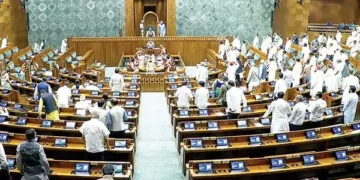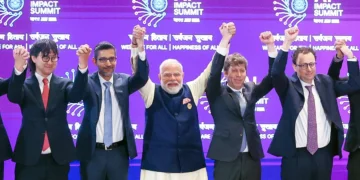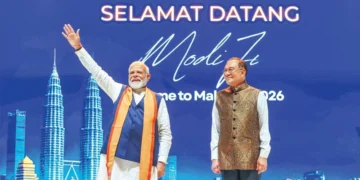Blitz Bureau
NEW DELHI: A fierce political confrontation erupted in Parliament on August 20 after the Union Government introduced three Bills seeking to disqualify the Prime Minister, Chief Ministers, and Ministers if they are detained on serious criminal charges for more than 30 consecutive days.
Union Home Minister Amit Shah tabled the Constitution (130th Amendment) Bill, 2025, the Government of Union Territories (Amendment) Bill, 2025, and the Jammu & Kashmir Reorganisation (Amendment) Bill, 2025 in the Lok Sabha.
The proposals mandate that a PM, CM, or a minister who remains in custody for a month on offences punishable with imprisonment of five years or more must vacate office.
While the President, Governors, and Lieutenant-Governors will serve as removal authorities depending on jurisdiction, the law also permits reappointment once the individual is released. Morality in politics Introducing the measures, Shah argued that the reform was essential to restore moral standards in politics. He said a person in jail cannot be expected to discharge constitutional responsibilities, and the Bills would prevent manipulation of the system by leaders under custody.
“The framers of our Constitution could never have imagined that individuals under arrest would continue to run governments,” he said, insisting that the move was aimed at strengthening democratic credibility rather than targeting any party or individual. The Opposition, however, mounted a strong attack, calling the Bills unconstitutional, anti-federal, and prone to misuse.
Congress leader Rahul Gandhi claimed that the proposals marked a return to “medieval times” where rulers could remove opponents at will. Trinamool Congress MPs staged protests in the House, alleging authoritarian intent. The Bills lay down uniform provisions for removal and the measures apply across the Union, states, the National Capital Territory of Delhi, and the Union Territory of Jammu & Kashmir.
Under the proposed law, any Prime Minister, Chief Minister, or Minister who is arrested and detained for more than 30 consecutive days in connection with an offence punishable with five years or more of imprisonment will have to vacate office. A notable clause provides that if a Prime Minister, Chief Minister, or Minister fails to resign voluntarily by the 31st day of detention, they will automatically cease to hold office from the following day.
However, the legislation also includes a safeguard permitting such leaders to be reappointed once they are released from custody, ensuring that their political career is not permanently derailed if acquitted or freed.
However, the Opposition and several constitutional experts have raised strong objections. They argue that the provisions carry the risk of being politically misused, particularly through selective use of investigative agencies Constitutional scholar Faizan Mustafa described the provisions as a “shortcut by law,” noting that India’s conviction rates remain extremely low. He warned that detention without conviction could unjustly disqualify leaders and erode the principle of innocence until proven guilty.
Supporters of the legislation counter that it would bring long-overdue accountability, prevent leaders from holding high office while facing grave charges, and reassure citizens about the integrity of governance.
The Bills have been referred to a Joint Parliamentary Committee (JPC), which is expected to submit its report in the Winter Session of Parliament.


























